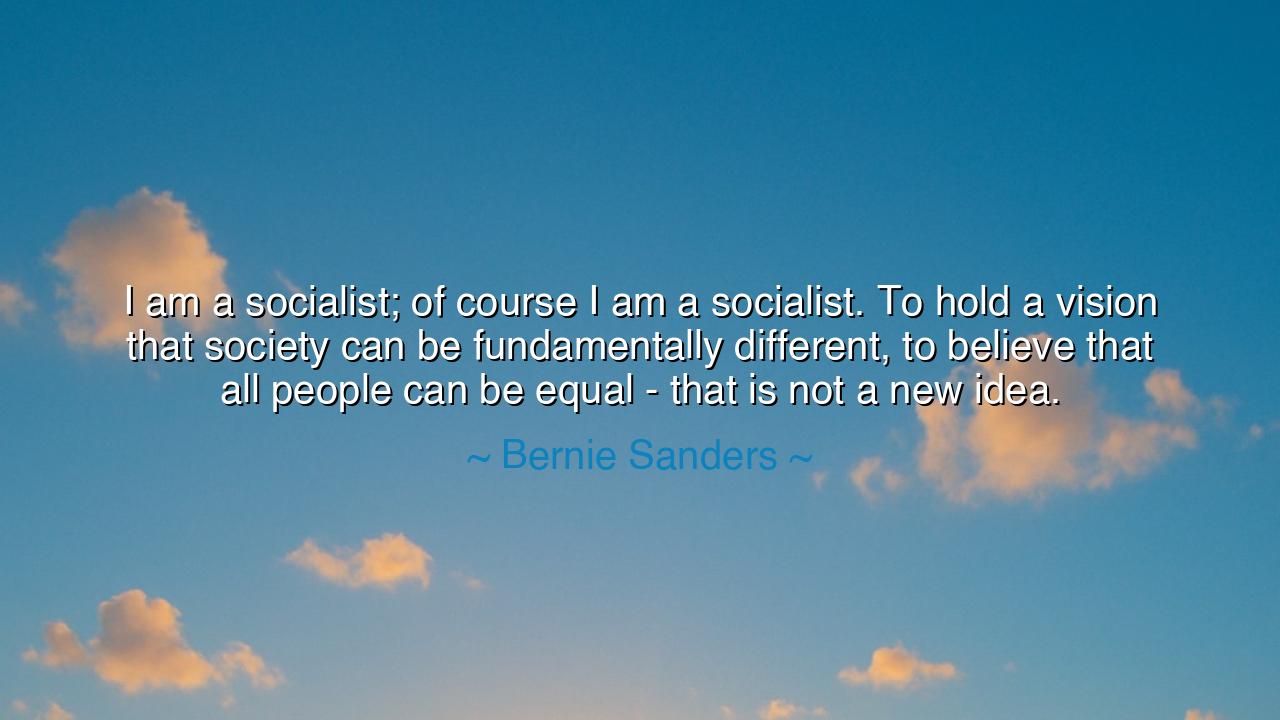
I am a socialist; of course I am a socialist. To hold a vision
I am a socialist; of course I am a socialist. To hold a vision that society can be fundamentally different, to believe that all people can be equal - that is not a new idea.






O seekers of truth and justice, hear now the words of a man whose voice rises like a trumpet across the fields of inequality and oppression. Bernie Sanders, a modern-day champion of the people, speaks thus: "I am a socialist; of course I am a socialist. To hold a vision that society can be fundamentally different, to believe that all people can be equal - that is not a new idea." These words strike at the heart of the age-old struggle, the struggle for a society that honors the dignity and equality of every individual. In his declaration, Sanders does not merely speak of his own beliefs; he speaks of a vision that has echoed through the chambers of history, a vision that was born long before our time and will continue to live long after we are gone.
To declare oneself a socialist is to take a stand—a stand not against the people, but for them. It is a declaration that the world is not as it should be, that inequality, whether of wealth, power, or opportunity, is not a natural law but a human-made injustice. Socialism is not a doctrine of newfangled ideas, as some would claim, but rather an expression of the oldest ideals of justice and brotherhood—ideals that have been passed down by philosophers, prophets, and revolutionaries throughout the ages. To believe that all people can be equal is not a radical thought, but a return to the ancient truths that bind us as one human family. It is a cry against the structures that divide us, a call to restore the balance that was lost.
Consider the great figures of the past who embodied this vision. Plato, in his work The Republic, envisioned a society where the pursuit of justice was paramount, where the philosopher-king ruled not with self-interest but with a heart dedicated to the common good. The great social reformers of the 19th century, like Karl Marx, called for the overthrow of systems that exploit the many for the benefit of the few. And even in our time, Martin Luther King Jr. spoke of a dream where all people, regardless of race, were judged not by the color of their skin but by the content of their character. These men and women did not speak of utopias or fantasies, but of a fundamental reordering of society based on the principles of justice, equality, and shared responsibility.
History, as the ancients knew well, is a cycle of struggle and renewal. Every generation must wrestle with the forces that seek to concentrate wealth and power in the hands of the few, at the expense of the many. But throughout history, there have always been those who have held onto the vision that a different society is possible. The French Revolution of 1789, for instance, was not merely a fight against a king and his nobles—it was a battle for a new world, where equality was enshrined as a fundamental right. It was a cry for liberty, equality, and fraternity, principles that resonate deeply in the hearts of all who seek a fairer world. The struggle may take different forms in different ages, but the essence of the battle remains the same: the battle for human dignity, for a society where every person can live free from oppression.
Sanders' vision is rooted in this long tradition, one that acknowledges the failings of the present but also points to the possibilities of the future. To believe that society can be fundamentally different is not a dream of impossibility, but a belief in the power of the people to bring about change. It is a belief in the idea that when we—the masses—rise together, we can create a world that is more just, more compassionate, and more equal. The challenge, however, is not just to dream of this better world, but to work relentlessly to bring it into being, even when the forces of greed and corruption seem insurmountable.
The lesson, dear children of the future, is this: hope is not passive; it is a call to action. The vision of a society where all people are equal is not a fantasy, but a moral imperative—a goal that requires not just words, but deeds. We must challenge the forces of inequality wherever they appear, whether in the form of economic oppression, racial injustice, or political corruption. We must remember that every great change in history was brought about by those who dared to believe that society could be different, and who fought with every ounce of their being to make that belief a reality.
So, I say unto you, do not let the idea of a just society be relegated to the realm of dreams. It is a call to arms, not of violence, but of conviction. Work toward a world where equality and justice are not privileges of the few, but the right of all. Stand with those who seek a better world, not because they are powerful, but because they are right. And remember: change does not come from the top down—it comes from the hearts of the people, from the desire to build a world that reflects our highest ideals. Let us rise, as one, and bring forth the society that we know is possible: a society of justice, peace, and equality for all.






AAdministratorAdministrator
Welcome, honored guests. Please leave a comment, we will respond soon